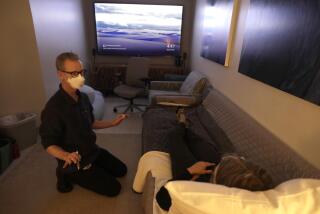Panel discourages premature curbs on lab-created life forms
- Share via
The not-so-distant prospect that scientists will be able to create new forms of life in the lab raises ethical and safety challenges, but progress in the field should not be hobbled by premature restrictions, a panel appointed by President Obama said in a report to be released Thursday.
The President’s Commission for the Study of Bioethical Issues acknowledged in its first report to the Obama White House that “do-it-yourselfers” — individual scientists and small labs working without institutional backing or restraints — will inevitably get into the synthetic-life business, and that without strict controls, synthesized forms of life might escape from labs and threaten to upend the ecosystem.
But the commission suggested that such nightmare scenarios were on the far horizon and might be averted most effectively through active public debate and education.
The potential benefits of such work — new vaccines and medicines and biological alternatives to fossil fuels, for instance — suggest that the government should be quick to support the research and very deliberate about imposing limits, the panel wrote. They also advised that government agencies should draw in scientists and hobbyists and make them part of the process rather than treat them as a renegade force.
The recommendations came in response to Obama’s first assignment to the 13 scientists, bioethicists and public policy experts he named to the commission: to consider the practical and ethical issues arising from an announcement in May that scientists had created living, self-replicating bacterial cells from genetic materials synthesized in a lab.
That work, led by microbiologist J. Craig Venter, former head of the Institute of Genomic Research, holds out the possibility that existing life forms could be altered beyond recognition by substituting their genetic material with chemically synthesized DNA.
“This science is in its infancy,” Amy Gutmann, chairman of the panel and president of the University of Pennsylvania, said in an interview Wednesday. That, she said, leaves governmental and scientific institutions plenty of time to agree on safeguards while ensuring that the applications with greatest public benefit are allowed to proceed unfettered.
The commission was keen to ensure that in the wake of fearful speculation after Venter’s report “there wasn’t an overreaction that would stifle the public benefits one can foresee,” Gutmann added.
In calling only for broad oversight of synthetic biology, Gutmann said the commission rejected the “precautionary principle,” which would have sought to block progress in synthetic biology until all its potential risks are identified.
At the same time, the commission, which had earlier heard testimony from dozens of scientists, bioethicists and religious leaders, forwarded a few proposals that could prevent or limit the harm from any release of synthesized life forms.
They suggested that scientists creating novel organisms by these means agree to insert lifespan-limiting “suicide genes” into the manmade DNA, or make the cells they generate dependent upon some food or fuel available only in the lab.







